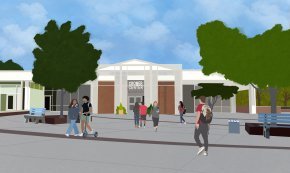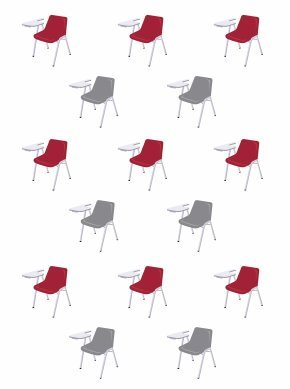
Building the Future
How Lenoir-Rhyne is Boosting Enrollment and Retention

The landscape of higher education is continuously shifting.
A common theme for many public and private universities in the last four years is a decline in enrollment and retention.
As higher education institutions across the United States grapple with declining enrollment fueled by growing skepticism about the value of a college degree, the financial burdens exacerbated by the COVID-19 pandemic, and shrinking birth rates, Lenoir-Rhyne University is tackling these challenges head-on.
ENROLLMENT
In the 2019-20 academic year, Lenoir-Rhyne saw the largest undergraduate class to date, followed by the second largest graduate student class, bringing total enrollment well over 2,700 students. Then a school year full of promise and new faces received news of an oncoming pandemic and uncertainty.
On March 27, 2020, North Carolina’s Governor Roy Cooper issued an executive order for residents to stay at home, and everything changed. Classes were moved online, tents and outside seating were set up for outdoor classes and social distancing, and faculty, students, and staff wore masks.
As the university prepared for the incoming class of 2024 to come onto campus in August 2020, some students chose to delay enrollment in favor of waiting for a more “normal” college experience while others stayed home to help their families.
“We all know the importance of an on-campus college experience for a traditional student and what it does for them — the building of community, a social life, experiential learning opportunities, access to mentors and resources. So sending everyone home was a big hit for the campus community, but when we brought everyone back in the fall with the safety measures in place, we had a new group of students who were now carrying a different mental load — from working multiple jobs to help their struggling families with bills to sudden familial deaths due to COVID,” shared Leah Beth Hubbard, DSL, assistant vice president for admission. “With all of this happening around them, traditional 18-and 19-year-old students are no longer the traditional students we have seen in the past. They are making hard decisions and having to be their own motivators.”
The incoming class that joined in fall 2020 was slightly smaller than the record-breaking class before — with enrollment hitting a 3.5% decrease from the year before. The logistical challenges presented in 2020 were not the only contributing factor, as there was a broader societal shift regarding the perceived value of higher education at play years before the pandemic began.
"The media, movies and even social influencers continue to downplay the importance of a college degree. It’s as if the same methods used to dissuade smoking — by removing its glorification from public messaging — were used against education. We hear that you can get by without a degree or start your own business, but what's missing from that narrative is what happens 10 years later when those same people hit a wall in their careers,” said Hubbard. “This media-driven perception, combined with challenges in financial aid and a world-altering pandemic, has created an alarming trend.”
Hubbard shared that the Pell Grant, which once covered two-thirds of a student’s tuition when it was created 51 years ago, now covers less than one-fourth of the tuition at institutions like Lenoir-Rhyne. "This growing financial gap, alongside rising interest rates on loans, has compounded the crisis, leaving many students questioning the value of a degree," she said.
To address enrollment challenges, Hubbard and her admissions team have ramped up recruitment efforts over the past two years. “Recruitment is all about relationship building, and that was difficult during COVID when we couldn’t meet face-to-face,” Hubbard explained. “Now, we’re traveling extensively, visiting high schools and community colleges.”
As part of the revamped recruitment efforts -— admissions counselors traveled to more than 450 high school college fairs in 2023-24 up and down the eastern United States.
“We are working with students from all areas — we are back in Florida, we’re in Texas, we’re in places where LR is attractive,” said Hubbard. “We’re trying to stay one step ahead — with enrollment declining 7% [nearly 1.5 million students] across the nation since 2010 and a population decline for the entire U.S., traveling outside of North Carolina is a move in the right direction for letting students know about LR.”

The increase in travel along with the partnerships with Lutheran high schools and congregations, and strengthening ties with high school counselors, whom Hubbard calls “a student’s number one ally,” are key factors in increasing the university’s visibility.
The team’s efforts are being noticed — with steadily increasing enrollment rates. From 2020 — including first years, undergraduate transfers and graduate students to 2024 — there has been a 4.2% enrollment increase and a 12.85% increase from fall 2021 to fall 2024 for undergraduates. But the standout increase goes to the transfers.
“In the last two years, thanks to our amazing faculty, staff and Bear Bound — a program where students who earn their associate’s degree through one of the partnered community colleges will have the general education requirements waived — the transfer student population has increased 220%,” shared Hubbard.
As the admission team is well into travel season and planning for the next class of new students to join campus in fall 2025, Hubbard is excited for this recruitment cycle. “We’re really focusing on value, outcomes, new populations and grassroots efforts. Through new marketing plans, increased travel and engagement opportunities — I see enrollment continuing to rise.”
RETENTION
While the excitement of being accepted into a university is a defining moment for students, maintaining that momentum throughout their academic journey is equally important. In the post-pandemic landscape, where student expectations and needs have shifted dramatically, retention efforts have become more critical than ever.
“It’s not enough to bring students into the university — we as faculty and staff need to create an environment where they feel supported, both academically and personally, to thrive throughout their time here,” Jennifer Burris, Ph.D., provost and vice president for academic affairs said. She shared the latest data for fall 2023 to fall 2024 retention for the university is the highest in at least the last seven years — at 76% — which is 5% above last year, and 3% above pre-COVID numbers. “At Lenoir-Rhyne, we recognize that retention is about building meaningful connections, providing robust resources and ensuring each student has the tools they need to succeed and graduate.”
One strategy contributing to increased retention this past academic year is reflection and adaptation when it comes to the programs, majors and academic offerings for students.
“LR faculty members are the experts in their fields and are constantly assessing and improving their curricula. In 2023, faculty committees processed more than 1,000 separate changes to the curriculum, ranging from small tweaks to course descriptions to full revamps of requirements for a major. For example, just this last year, our undergraduate engineering physics, religion, and music programs went through a comprehensive review of their curriculum and updated their curriculum to meet the needs of our students, employer needs and graduate school requirements,” shared Burris.
Through these constant assessments in the last five years, nine undergraduate majors and four graduate programs have been added to keep up with the demands of growing technology and business fields.
Changes are also occurring on campus to accommodate new and updated curriculum. Internal processes and technologies are being upgraded to effectively provide a working system for students, from working with the Registrar’s Office to enact best practices in software system updates to updating the registration processes for adding, dropping and retaking courses — the updates are streamlining all aspects of the student’s registration process.
By providing clear enrollment processes and smooth graduation procedures, Burris shares LR is contributing to a positive student experience which ultimately leads to higher retention rates, improved graduation rates and increased student satisfaction.
A lack of adequate academic preparation can lead some students to feel overwhelmed by the demands of college. When they struggle, they may give up rather than using available sources. One of those resources is BEAR (Belonging, Equity, Access and Retention) Central.
“BEAR Central works with all students to support them academically. We are intentional about getting out of the second floor of the library space and visiting classrooms, events, dorms, etc. to make sure students know about the resources we offer to help set them up for success. We focus on meeting the students where they are and making access as efficient as possible,” Teena Brooks, M.A. ’17, director of BEAR Central said.
Those resources include undergraduate advising, undergraduate and graduate academic support services, writing and speaking services, tutoring services, peer academic coaching and student success services.
“If a student feels like they belong (B in BEAR), they have a higher chance of succeeding in obtaining a college degree and staying at LR,” Brooks said. “By validating their concerns and helping to alleviate the pressure of thinking they have to have it all figured out right now as a student, and by being a first stop resource to get them connected to campus on a larger scale, we aid in helping them succeed in and out of the classroom.”
To remove anxiety about the unknown and simplify processes for students and advisors alike, in spring 2025 the university will launch Stellic, a new advising software for advising teams and faculty.
“With Stellic, advisors can see everything on a single computer screen: all the classes a student must take to graduate and what classes they've taken. It's a very transparent way for students and advisors to map out their four years and what classes they can take every semester to graduate,” shared Burris. “Advisors can leave notes for students, and it is continuously updated — running in real-time to provide the most accurate audit.”

Looking at the future of LR, the BEAR Central team shared that by making processes as simple as possible for students to work towards a degree, it will help them not only to stay at LR and feel supported, but also to graduate with confidence.
“Potential and current students want answers to questions like ‘Why LR? Why higher ed? Why do I need general education?’ LR has already addressed some of these concerns in the focus on building a strong relationship with the community colleges in North Carolina, which is helpful for students who are transferring to LR,” Brooks shared. “We are addressing concerns regarding easier transfer credit processes, lowered the number of required general education courses, are providing clearer information around majors and the requirements, and academic planning. Students want to know more about why they are taking certain classes and be able to access the information easily.”
As the processes in place help set up students for success, and the BEAR Central team provides advising and academic support, the Office of Student Affairs is helping to ensure they feel seen, heard and engaged on campus.
“What we’re seeing from students is they're not only wanting to gain a college degree, but they also want to gain skills during their time here — tailoring and focusing on engagement opportunities, co-curricular experiences, and ensuring they have a tangible set of skills that will allow them the opportunity to be a step ahead as they go into the workforce,” said Harry Titus, Ed.D., assistant vice president for student affairs and dean of students. “This generation of students wants to be in college, but they also want to ensure that there's a value in everything that they're doing.”
Through engaging in student groups on campus such as the Campus Activities Board (CAB) or Student Government Association (SGA), students are coming away from the experience with those tangible skills that answer the question of “How do I learn to lead people now, so I can lead when I enter the workforce?”
“I think all of higher education is trying to figure out ways that we can ensure that there are skills and learning opportunities in everything that we do,” Titus shared.
These are the skills Alexis Romero ’24 is taking with her as she starts her career in journalism with a local newspaper in Hickory as a freelance writer.
“My time at Lenoir-Rhyne provided me with real-world experiences to see how communications play a pivotal role in literally everything within a person’s daily life,” shared Romero, who graduated this spring with a B.A. in multimedia communications. “I was a first-generation college student, and I had support from so many faculty and staff members. Achieving something no one else in my family has meant a lot to me, and I feel prepared for the job world by having a degree that is versatile in the job market for years to come.”

Stephanie Watts '11, M.A. '24, reflects on the joyful balancing act of fostering.
View More